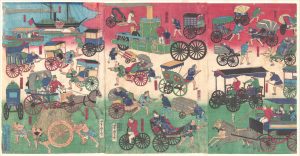(Art)iculations of Proximity and Mobility
10Th Annual UCR History of Art Graduate Student Conference
Held virtually via Zoom
May 14 and 15, 2021
Register at: https://ucr.zoom.us/webinar/register/WN_3EaZPB7vSZyEsThVUoDuew

Utagawa Yoshitora, Vehicles on the Streets of Tokyo, 1870. Courtesy of the Metropolitan Museum of Art.
The ongoing COVID-19 pandemic has separated and grounded people across the globe to varying degrees over time. It has introduced new notions like the “essential worker”—defined by their closeness to the crisis—and “6 feet” as a safe amount of nearness. It has illuminated mobility and immobility as both privilege and inequality—when some, for example, have the means to flee high-risk environments, while others don’t, and some have the option to stay home, while others must continue to move and engage person-to-person for their livelihood.
The significance of proximity–understood as nearness in space, time, or relation–and mobility–the ability to move or be moved freely and easily–as both conditions and concepts is perhaps more apparent than before. In fact, art history as a discipline is impacted by certain ideas of proximity and mobility: from early historians’ belief in “distanced” or “objective” narratives; to the methodology of “close-looking”; to the “aura” of the site-specific object; to the importance placed on travel in research. This conference asks: how have “the arts”—defined broadly and including visual and material culture—been shaped by proximity or mobility, and how have they articulated their own vision of closeness and movement as conditions or concepts? What can they tell us about how proximity and mobility have been valued, ignored, related, defined, interrogated, or challenged across time, places, and peoples? Why do these (art)iculations matter? This conference seeks papers that speak to these and related questions, and encourages submissions from across the disciplines and with an expansive notion of the arts.
Keynote Speaker: Dr. Cheryl Finley, Associate Professor, Department of the History of Art, Cornell University
Visit the AHGSA conference website for more information: https://ahgsaconference.ucr.edu/
